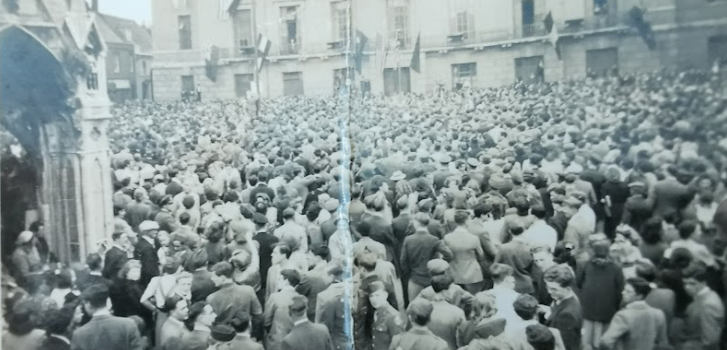Cambridge Market Square on VE Day, 8 May 1945
by Dr N Henry
VE Day (Victory in Europe Day) was celebrated on 8th May 1945 in Cambridge with a mixture of joy, relief and sobriety. Unlike London that was devastated by the blitz, Cambridge was spared from intensive enemy bombing and the number of civilian casualties was relatively low. However, on VE Day the fate of many soldiers belonging to the Cambridge regiment was still unknown. Seven hundred and eighty-four soldiers were never to come back from the Far East, most dying in terrible conditions in Japanese Prisoner of War camps. These men would remain absent forever, having sacrificed their lives to the War.
French philosopher Pierre Janet wrote that “the purpose of memory is to triumph over absence”. By engraving in stone the names of those who did not return, the people of Cambridgeshire started the fight against absence through the act of memory. VE Day is important because memory is an essential function for building communities and forging the solidarity necessary for human survival. It is only through memory that the absence of those who gave up their lives heroically can be overcome; through memory that peace, the absence of war, can be cherished; through memory that food, the absence of rationing, can be appreciated; through memory that light, the absence of blackouts, can be fully enjoyed.
On Thursday 3rd September 2009, Cambridge News published a souvenir supplement marking the anniversary of the start of WW2. The newspaper shared the memories of three Cambridgeshire readers including Eileen Bernard who was six when the war started. As well as gas masks, air raids and bombs close to the Chivers jam factory in Histon, she recalled how excited she was when, after the war, she was “walking down Arbury Road to Milton Road to see the street lights switched on…I had never seen the street lights before – they looked magical”.
VE Day is an important moment as it is a space to remember what absence is. The absence of street lights during WW2 and their return after the war was very real for Eileen and, many years afterwards, takes on a symbolic value for new generations. The absence of light becomes the symbol for the absence of peace, stability and normality, essential components for long and happy lives.
“There is no glory in war,” said Second World War bombardier Tom Jones in a recent BBC interview. However a great sacrifice was made by the Cambridgeshire men and women who fought for their country, and should not be forgotten for their heroic actions. We owe to them our peace, something to be cherished in a world where war is still sadly commonplace.
Why not have a look at our VE Day celebration brochure on Capturing Cambridge:
